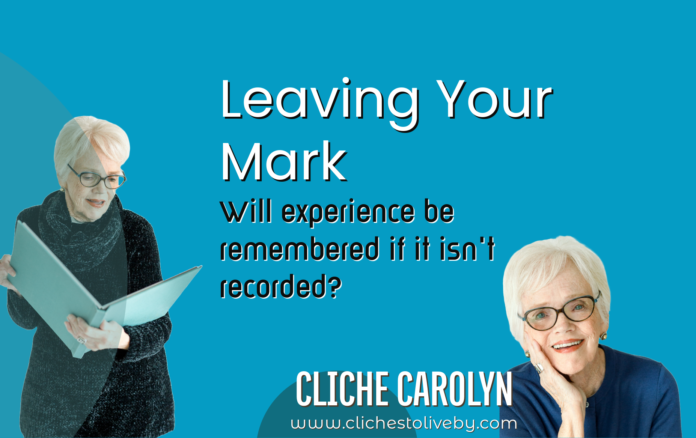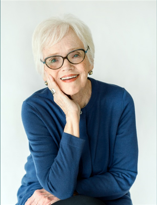Dr. Carolyn Lee reflects on a different cliché each week. Recently, in her blog “Flying Solo,” she considers the merits of the single life. This week Carolyn explores the cliché, leaving your mark.
Learn more about Dr. Carolyn Lee on her biography page or investigate 29 more clichés in her latest book, Keep Your Eye on the Ball And Other Clichès to Live By.
Leaving Your Mark
Last December, I said I’d write a blog every week for a year. This is number fifty-two. I’ve covered lots of ground in the fifty-one blogs I’ve sent out into the cosmos. I’ve covered subjects ranging from the significance of wearing apparel to the baking of lemon meringue pie. I’ve expressed my admiration for Barbra Streisand and my fear of Donald Trump. I’ve admitted to guilty pleasures and acknowledged my appreciation for silence and solitude. I’ve asked myself some hard questions and been surprised by some of my answers. Writing a blog has been a learning experience I hadn’t anticipated.
Becoming an “author” at eighty-three was a plot development I didn’t see coming. I had always considered myself a teller of stories, but, until I received some major nudging, I hadn’t seriously considered getting those stories between the covers of a book. But that’s what happened. I was nudged, encouraged, and assisted, and just about this time last year, Keep Your Eye on the Ball And Other Clichés to Live By appeared in print. I can’t really express to you what a shock it was to see that book, with my name on the spine and my picture on the cover, right there on the Amazon page, along with real books by real authors.
Now that the book is out there and the year’s worth of blogs is nearly behind me, I find myself reflecting on the writing process. I have been surprised by it—surprised because I honestly didn’t know all those thoughts and feelings and opinions were up there, swirling around in my head. It wasn’t until I felt an obligation to write, and I had self-imposed deadlines to meet that I realized how full I was of unexpressed ideas. Just yesterday, as I was making my way through Abraham Verghese’s dense and complex novel, The Covenant of Water, I came across this line by a character who had discovered himself to be a writer: “One writes to know what one is thinking.” Yes. There were times when I saw my words appear on the screen of my laptop and thought, “How interesting. I didn’t even realize I thought those things.”
Many of the stories I included in the book and in the blogs are ones I’ve been telling for years. They are part of the “repertoire” of examples and illustrations that have helped me convey the lessons I’ve attempted to teach or the points I’ve tried to make. I remember reading one time that the way people recount experiences to others shapes the way they remember those events. And I realized that, if I hadn’t been telling those stories, if I hadn’t written them down, I would have forgotten the experiences.
Again in The Covenant of Water, the budding writer wonders, “How many insights vanished into the ether because they weren’t written down?”
When my now twenty-four year-old nephew was a baby, I decided I would keep a journal about him on my computer. I would tell his story. I would record all the darling things he would do and the terribly clever things he would undoubtedly say. And I actually did it. I kept that journal for six years. Just last week I decided I would have it printed and put in a notebook, and I would give it to him for Christmas. Just for fun, I thought I’d skim through it and remind myself of the kinds of things I recorded. I ended up reading it cover-to-cover, sometimes getting a little teary, sometimes laughing out loud and frequently saying, “Oh, I had forgotten that!” I can tell you, without qualification, that, if I hadn’t kept that journal, more than half of the experiences I wrote about would have vanished into the ether.
Not everybody wants to write a book. Most people would find writing a blog every week a real grind. But all of us have stories to tell. All of us have had experiences we want to remember, experiences that ought to be shared. I’ve become aware in the past few years of the dozens of products out there designed to encourage people to tell their stories—“Table Topics,” “How Do You See the World?,” “Talking Point,” “Life Story Interview Kit.” Ads for a box of cards called “Legacy Deck” has this to say: “Whether you’re looking to uncover someone else’s life story or share your own, these cards provide the perfect spark for inspiring conversation. Capture these moments in writing, in video, in a scrapbook or anywhere that will help the legacy live on.”
When I was writing the book, I honestly wasn’t thinking about legacy. But when I hold the book in my hands, I realize that it is something I can place in the hands of others; it is something more permanent than I am. I read recently that “the power of a person’s life is the stories they leave behind.” The only way to leave a story behind is to say it out loud, to write it down, to make a record of it, to put it in a scrapbook. I have recorded some of my experiences in a book and in a year’s worth of blogs. But my story continues, and I am its protagonist. What does the next chapter hold? I don’t know what I think about that, but maybe if I keep writing, I’ll find out.
Want to Read More?
Check out Dr. Carolyn Lee’s blogs on her website, she features a new cliché each week or you can order her new book, Keep Your Eye on the Ball And Other Clichès to Live By. Want to know more about the woman behind the words? Read more about Carolyn here. We hope you enjoyed this article learning more about the cliché, leaving your mark.












